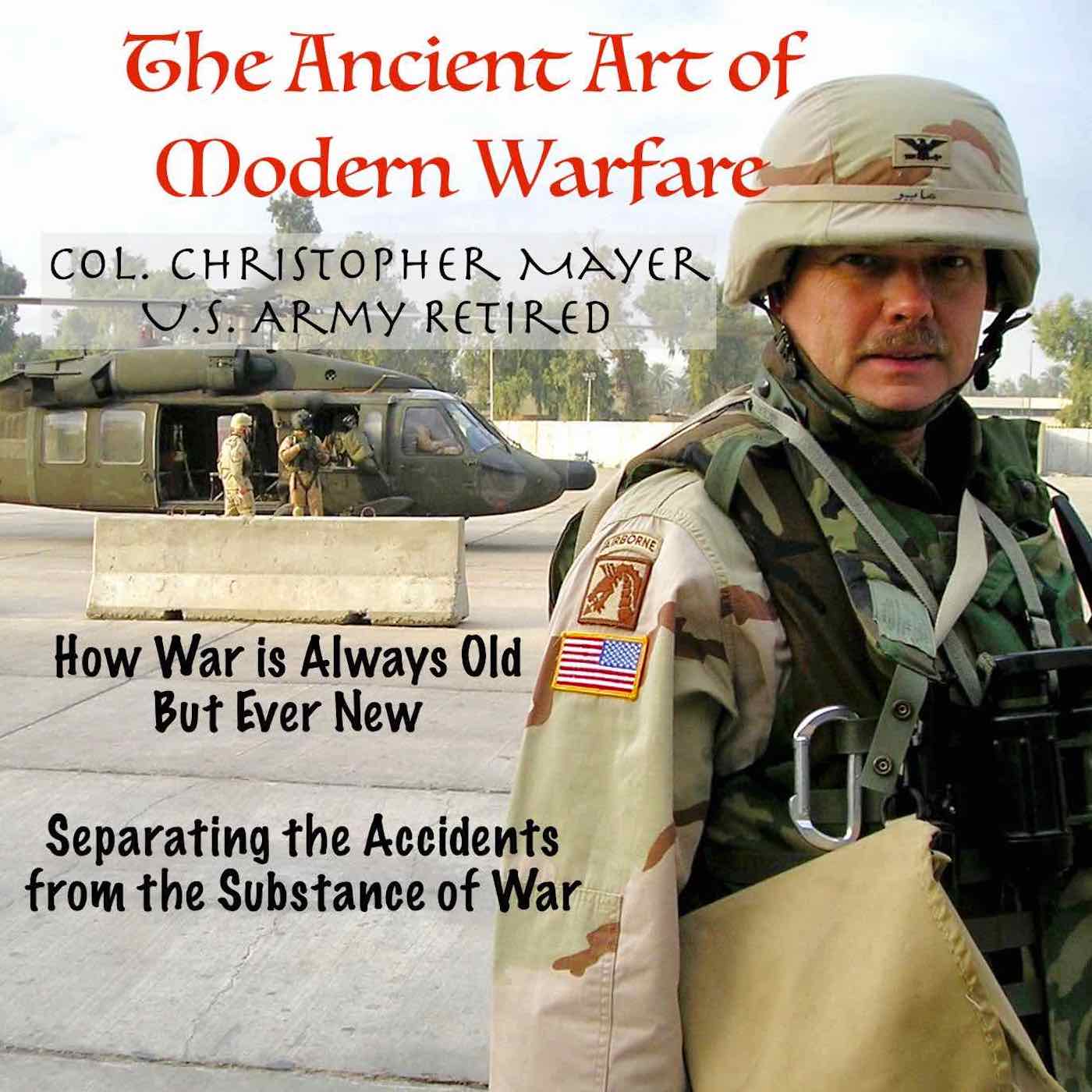Episodes

Sunday Aug 24, 2025
What does Putin want? (E114)
Sunday Aug 24, 2025
Sunday Aug 24, 2025
Although diplomacy should not end when fighting begins, there are two conditions in war where one or more parties will seek to negotiate peace. One is when victory looks improbable, the other is when it looks certain. Which of these conditions is emerging in Ukraine? More importantly, which of these two conditions does Putin perceive as operative? In either condition, is negotiation leading to a sustainable peace realistic? Answering that question requires understanding what Putin really wants from his war, and what he will accept to get out of it.
Reference: Samuel Charap, Khrystyna Holynska, Russia’s War Aims in Ukraine, http://www.rand.org/t/RRA2061-6
Music: Holst, “The Planets: Mars Bringer of War,” downloaded from the Internet Archive https://archive.org/details/lp_holst-the-planets_gustav-holst-leopold-stokowski-los-angeles

Thursday Aug 14, 2025
Pope Leo and Ending War
Thursday Aug 14, 2025
Thursday Aug 14, 2025
Recently, Pope Leo XIV used the anniversary of the atomic bombing that ended WW2 to call for the rejection of war as a means to resolve conflicts. In ending war, or keeping war from breaking out, we must remember that war is a tool for resolving pre-existing conflicts. Ending war requires identifying and resolving those conflicts so that they do not become the seeds for future wars.
Music: Liszt, Les Preludes, US Marine Corp Band (Public Domain)
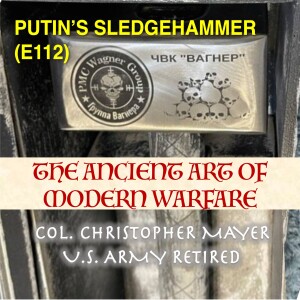
Tuesday May 27, 2025
Putin's Sledgehammer (E112)
Tuesday May 27, 2025
Tuesday May 27, 2025
Putin’s Sledgehammer: The Wagner Group and Russia’s Collapse into Mercenary Chaos, by Professor Candace Rondeaux is a must read for anyone interested learning how Russia came to rely on mercenary-like organizations in its global strategy and how it has used them. This book is not just about Yevgeny Prigozhin and Wagner, not even about Russia's other quasi-mercenary actors. It is an excellent summary of how Russia has come to be what it is since the collapse of the Soviet Union. The opening section alone is worth the cover price of the book. This is an extensive who is who of Russian oligarchs, generals, and mercenaries. Putin’s Sledgehammer is not what one might consider a dry academic thesis. Professor Rondeaux tells this story better than any spy-thriller, better because it is true. Like most true stories, it seems more fantastical than any political fantasy. It tells why Russia intervened in Syria, Africa, Ukraine, and elsewhere, who are the players in developing that strategy, and how they implemented it. In shining the spotlight on Russia, the United States and the West in general is not let off the hook. The West did not simply stand aside while Russia pursued a global strategy through mercenary means. Western political leaders, however, made the mistake of thinking that Russia would turn away from its disruptive approach and accept the Western rules-based order if only given the proper incentives and sanctions. The West failed and continues to fail to understand Russia just as Russian leaders continue to misinterpret and misapply ways and means employed by the U.S. and its allies. In summary, Putin’s Sledgehammer is an outstanding single source for anyone interested in Russian imperial aspirations and the unconventional means it uses in pursuit of those goals.
References:
Rondeaux, C. (2025). Putin’s sledgehammer: The Wagner Group and Russia’s collapse into mercenary chaos (First edition). PublicAffairs.
The Ancient Art of Modern Warfare:
- Episode 2: “What Are Russian Private Military Companies?” (2019)
- Episode 4: “The Difference Between Russian Quasi-Mercenary Organizations and Western PMSCs” (2019)
- Episode 6: “Meeting the Challenge” (2019)
- Episodes 35-39: On Mercenary Warfare (2021)
- Episode 54: “Russian Mercenaries” (2022)
- Episode 63: “Why Wagner” (2023) (Which contains one guess that may have been true at the time, but was ultimately unreliable.)
- Episode 75: “Wagner Decapitated?” (2023)
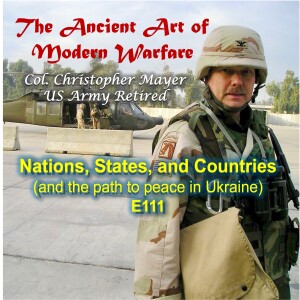
Wednesday May 21, 2025
Nations, States, and Countries (E111)
Wednesday May 21, 2025
Wednesday May 21, 2025
I am picking up my podcast series where I left off, addressing the challenges of peace. War is an act of violence among nations or states, affecting entire countries. These terms, nations, states, and countries are not synonymous. Confusing these terms leads to misunderstanding, misinterpretation, or can be used to create misperceptions. In this episode I try to clarify the difference among nations, states, and countries. Understanding the differences and relationships among these terms is important to analyzing the actual and claimed objectives of warring parties and to identify emotion driven propaganda that obstructs the path to peace.
The information in these podcasts represents only my own thoughts, and not those of any organization I am, or have ever been associated with. (Some of what I say may be completely opposed to official position of some of the organizations.)
Music:
- Liszt, Les Preludes, perfomed by the USMC Band. Public Domain
- Copland, A. & United States Marine Band. (2000) Fanfare for the Common Man. unpublished, Washington, DC. [Audio] Retrieved from the Library of Congress, (Fair use for educational purposes.)
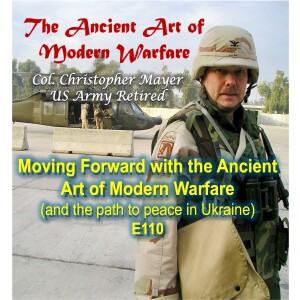
Tuesday Mar 04, 2025
Moving Forward with the Ancient Art of Modern Warfare (E110)
Tuesday Mar 04, 2025
Tuesday Mar 04, 2025
Now that I have laid the groundwork for what I think everyone needs to know about war, I can digress and address current topics of interest, placing them in the framework of the Ancient Art of Modern Warfare. In this podcast I build on the topic of peace in the last episode to address current developments regarding Ukraine. Russia is the aggressor. Putin cannot be rewarded for his violations of international law, the laws and customs of war, both jus ad bellum and jus in bello, and threatening the peace and security of all of Europe. However, without a Western commitment to apply overwhelming force against Russian aggression, a cease fire is in order. The death and destruction of war without any serious prospects for victory violates Just War principles of proportionality and reasonable probability of success. Even Clausewitz would agree.
As usual, the opinions in these podcasts are my own and do not necessarily represent the opinion of the Department of Defense, anyone else in the U.S. Government, or any other organization I am or ever have been associated with.
Music: Wagner, R. and US Marine Corps Band, Siegfried’s Funeral March and Finale (Götterdammerung) from “Music of Richard Wagner” (1981) (Public Domain)
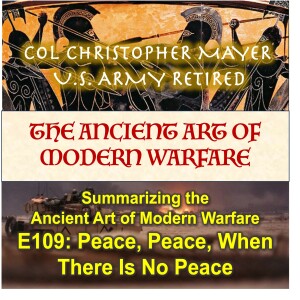
Tuesday Feb 04, 2025
E109: Peace, Peace, When There Is No Peace
Tuesday Feb 04, 2025
Tuesday Feb 04, 2025
In my closing podcast summarizing the Ancient Art of Modern Warfare I review key points from Episodes 91-96 about peace, with an application to current events. When we are trying to figure out conflict termination the take-away should be that peace after war depends on:
- Jus ad bellum and jus in bello. The material evils of war are only justified to correct an injustice so great that the continued harm of that injustice is worse than the harm caused by that war. The cure cannot be worse than the disease. Jus in bello limits those harms and makes the restoration of peace easier.
- Being feared but not hated. This goes with Jus in Bello. Deliberate actions that cause unnecessary death and destruction, particularly to the civilian population and cultural/religious works, can inflame passion and hatred among the civilian population. The result can both extend the conflict and instill long-lasting resentments which plant the seeds of future war.
- Jus post bellum: Establishing or re-establishing justice. Victory is not peace. It does not correct the injustices that justified the war. Victory, or the point where both sides are so exhausted that they accept a truce, is merely a necessary pre-condition for building a peace that addresses the root causes of the injustices that led to armed conflict.
Sadly, these are largely ideals, rarely practiced throughout history. They are derived from the numerous examples in the history of warfare which disregarded these concepts and the far fewer examples in which they were practiced, leading to a more sustainable peace.
Although this is the last episode covering the fundamentals that I think every citizen should know about war, the podcast will continue, but more on that next week.
Music: Copeland, A., and the US Marine Corps Band, Fanfare for the Common Man (2000), Library of Congress recording
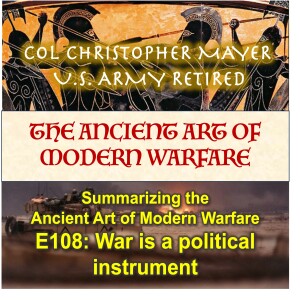
Friday Jan 10, 2025
War is a Political Instrument
Friday Jan 10, 2025
Friday Jan 10, 2025
After taking a Christmas break, I am picking up on my summaries of the Ancient Art of Modern Warfare. In the previous episode, I described the nature of war as violence intended to compel an opponent to submit to your will. Although this idea is described by Carl von Clausewitz in his magnum opus, On War, the Prussian philosopher of war is best known for the aphorism that war is a continuation of politics by other means. It is a catchy phrase, but that translation leaves a lot to be desired and misses key points Clausewitz wanted to make. As I see it, the key take-aways from this idea are:
War must be viewed as an instrument of national policy – one among many. War is not the policy; war is inserted to the ongoing political engagement to achieve the policy objective.
- Therefore, it is important to know what that policy is – the objective the policy intends to achieve. That is, to understand what a nation intends to achieve by war, before embarking upon it.
- It follows then, that the use of force in war must be consistent with the aims of that policy.
- Not all wars have the policy objective of overthrowing the enemy.
- A suspension of active warfare does not necessarily mean abandoning the strategic policy objective.
- If you want to end a war, achieve or change the policy objective.
Reference: v. Clausewitz, C., On War, (Michael Howard and Peter Paret Ed. And Tansl.) © 1976 Princeton University Press, New Jersey, USA
Music:
Holst, G. The Planets: Mars, Bringer of War, Internet Archives, https://archive.org/details/GustavHolstThePlanetsMarsTheBringerOfWar_201709
Traditional, The Army Strings, Garryowen (Public Domain(

Friday Dec 13, 2024
E107: The Unchanging Nature of War
Friday Dec 13, 2024
Friday Dec 13, 2024
In this second episode of my summary series, I address the Nature of War. That nature is violence directed at an opponent to coerce him to submit to your will. This violence has always been the nature of war and it will always be so. Further, this violence must be so painful to your opponent that he will prefer submitting to your will rather than continuing to resist. How you apply that violence and where the pain must be applied changes with time, technology, and culture. Further, the tools to apply this pain are not just kinetic, or direct military action. Economic pain can be just as important as military force. So too is information directed towards increasing fear of pain in the opponents’ population, its leaders, and your opponents’ friends. What makes war different from other forms of violence is its political nature. This violence is directed towards achieving a political end state. Without directing military force to a clearly defined political objective military success is still possible but will, more than likely, end in strategic failure.
For more information refer to Episode 7 of this series, “What is War;” Episode 8: “The Natural Laws of War;” Episode 42: “All Successful Wars Are Alike;” and Episode 43: “Ways to Lose a War.”
Reference:
- Clausewitz, C., On War, (Michael Howard and Peter Paret Ed. And Tansl.) © 1976 Princeton University Press, New Jersey, USA
Music:
- Holst, G. The Planets: Mars, Bringer of War, Internet Archives, https://archive.org/details/GustavHolstThePlanetsMarsTheBringerOfWar_201709
- Wagner, R. and USMC Band, Siegfried’s Funeral March, Public Domain
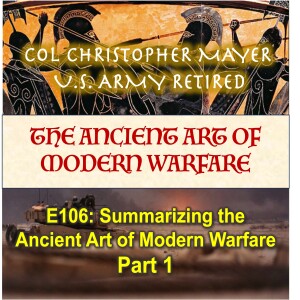
Saturday Dec 07, 2024
E106: Summarizing the Ancient Art of Modern Warfare, Part 1
Saturday Dec 07, 2024
Saturday Dec 07, 2024
For a little more than five years and 105 episodes, I have been podcasting on what I believe everyone can and should know about war and sometimes more specifically the characteristics of the persistent conflict we see in the world around us. Almost every week, something develops that want to explain by placing it within the context of the enduring nature of war – and the pursuit of peace. That said, I think that I have just about said everything that needs to be said explaining what war is, how it is unchanging in nature, and how even the changing characteristics of war demonstrate war’s unchanging nature. In trying to respond to emerging events, this description was not laid out in any sort of logical framework. So, in the next few episodes I will try to summarize the key points, or takeaways, of the past hundred plus episodes, in a way that does provide that logical framework.
The opinions in these podcasts are my own and do not necessarily represent the opinion of the Department of Defense, anyone else in the U.S. Government, or any other organization I am or ever have been associated with.
Music:
- Copland, A. & United States Marine Band. (2000) Fanfare for the Common Man. unpublished, Washington, DC. [Audio] Retrieved from the Library of Congress, (Fair use for educational purposes.)
- The Army Strings, GarryOwen (Traditional) (Public Domain)
- Kilstoffe, Jens, The Cavalry, Machinamasound (Licensed)
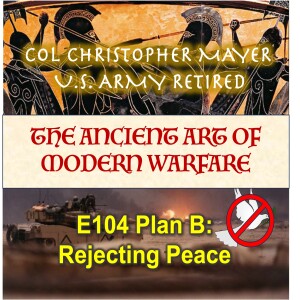
Wednesday Nov 20, 2024
E104 Plan B: Rejecting Peace
Wednesday Nov 20, 2024
Wednesday Nov 20, 2024
In a recent episode of my podcast series of “The Ancient Art of Modern Warfare” (E104) I described possibilities for an end to the fighting in Ukraine. Of course, any end to any armed conflict requires the agreement of both (or all) parties to the conflict. Russia’s invasion of Ukraine is no different. It is entirely possible, perhaps likely, that one party does not want an end to the fighting. The other party, on the other hand, is not willing to accept peace, or even an armistice that rewards an invasion of their nation. I do not have any answers. This short episode is an addendum to Episode 104 in which I bring up some issues I think we should consider before any armistice or peace proposal is rejected.
As usual, the opinions in these podcasts are my own and do not necessarily represent the opinion of the Department of Defense, anyone else in the U.S. Government, or any other organization I am or ever have been associated with.
Music: Wagner, R. and US Marine Corps Band, Siegfried’s Funeral March and Finale (Götterdammerung) from “Music of Richard Wagner” (1981) (Public Domain)

